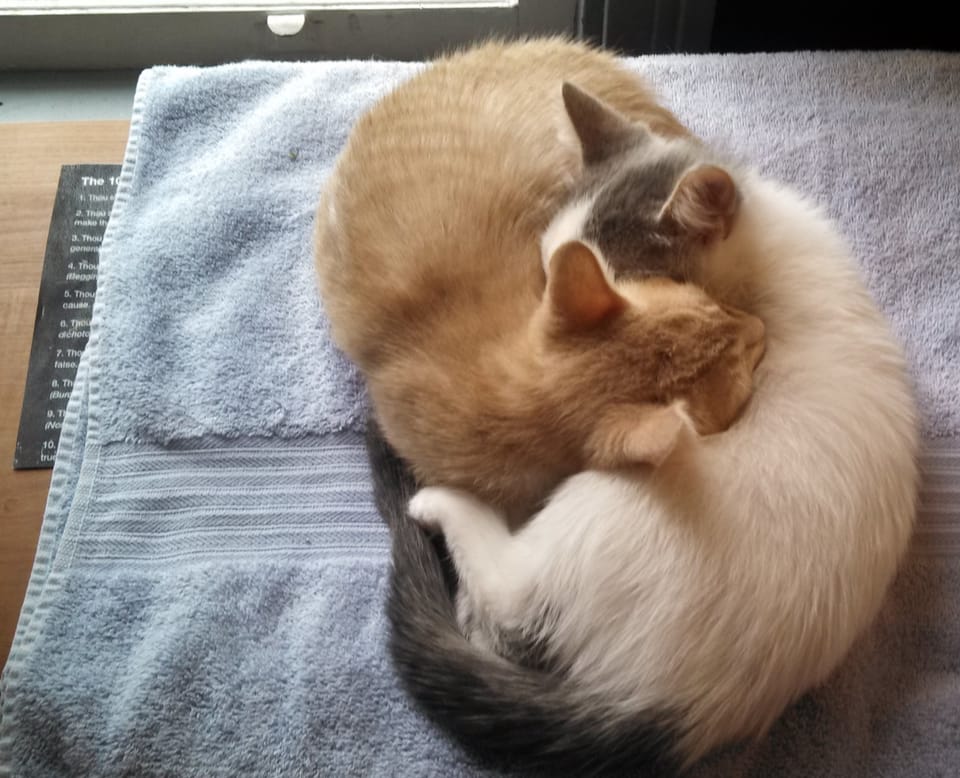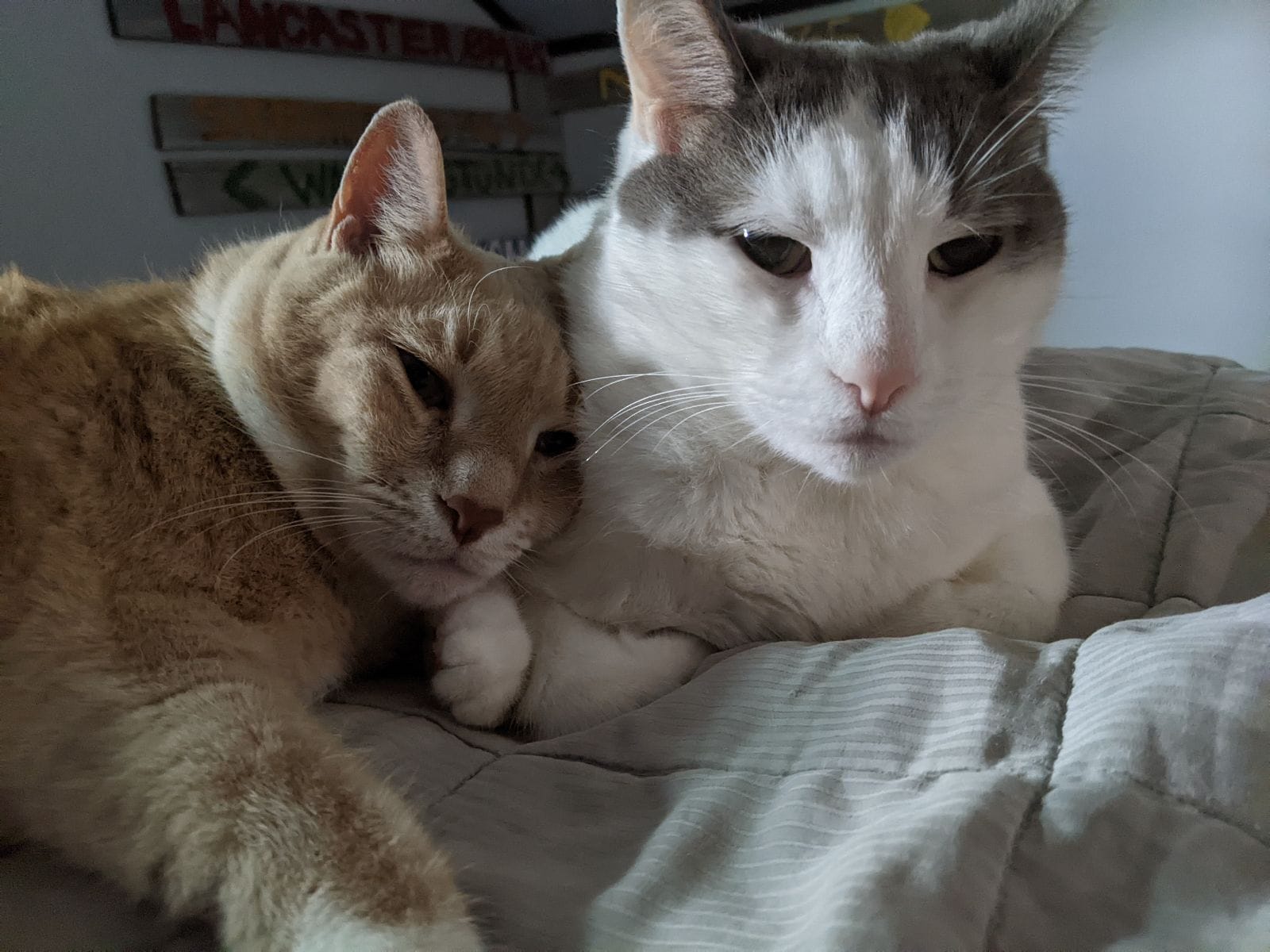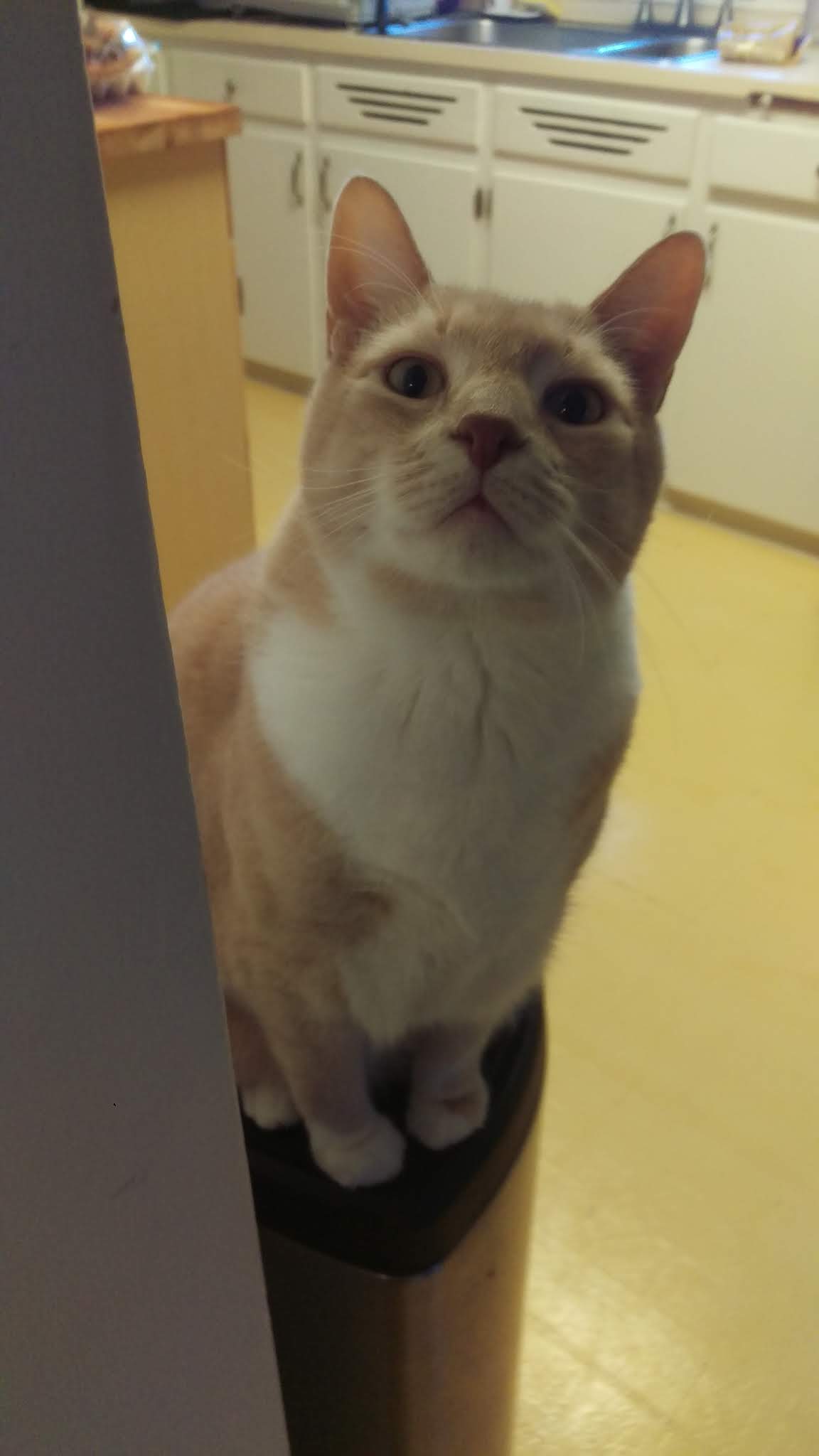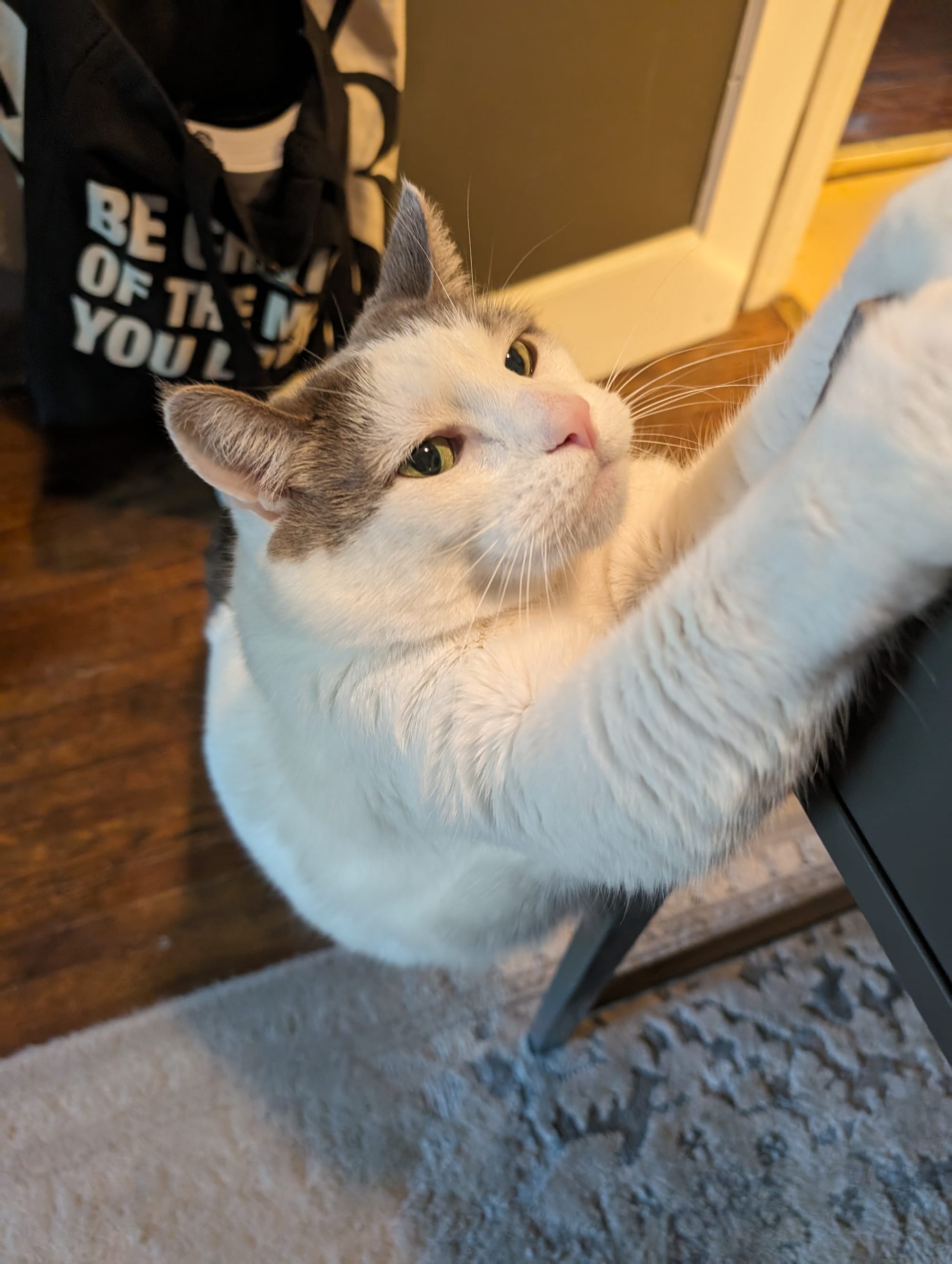Dissertating About the Public/Private Divide with Shawna Coppola

#Caturday on Twitter used to one of my favorite things. Not only because it meant seeing all sorts of cats being all sorts of awesome but it meant getting little glimpses into EduTwitter friends' lives. Corners of artwork on their walls, couches and chairs, bookshelves, little moments of other people's ordinary lives in the corners around their perfect cats. Even in the decade-old picture in the heading of my two chonks, Steve! (he yells. A lot. So we officially added the ! to his name and no one loves it more than the young woman who works at our vet's front desk) and Kevin, you can see a list of logical fallacies I used to have taped to my desk.
I no longer have that list on my desk and Darth is doing yeoman's work of sharing pet pictures on BlueSky. The boys are technically senior cats and I miss the casual fun that #Caturday brought.

I also miss the impact #Caturday had on EduTwitter. To a certain extent it, and the other ways of building community such as Nate's movie poll (now on Instagram), smoothed over hard edges that emerged during discussions during the week. Those edges got a bit sharper in 2016 and then in Spring 2020 and COVID, everything and everyone got a lot more brittle. Those rough edges can't be smoothed over with cat pictures. Alas.
Back in the days of 160 characters, the issue of separating personal and professional was a popular topic. There were even #edchats about what to tweet or not tweet from a classroom account and sometimes, people would even apologize if they tweeted out about their favorite hobbies or kids from their “professional” account. We adults get to decide how much we share (or don’t) on social media which is exciting and complicated and messy. So, yet again, I wanted to talk to someone about it. Shawna Coppola has a different approach to the public/private divide than I do. She's also brilliant, thoughtful, and generous.
My questions to her are below in bold.
I wanted to ask you about this topic because of your wonderful book, Literacy For All, and some of your social media posts. You are so, and admirably, present in both! I had the pleasure of reading one of your chapters while you were writing and it was absolutely infused with your sense of self, even in early drafts. Your end of chapter prompts, which some authors struggle to make engaging and relevant, feel like questions you yourself have thought deeply about. Have you thought about what and how much to share? Drawn formal lines or was the process something else?
Thank you–I worked hard on those reflection questions! And yes, I have thought–and often–about what and how much to share with my fellow educators. As a matter of fact, every few months or so I think about whether to create a separate so-called “professional” account on social media–mostly on Instagram or TikTok. (I actually DO have a separate account on TikTok that I’ve since abandoned, and I used to have a separate FB account.) What I keep coming back to, though, is that due to the nature of teaching and learning, which is inherently social, it is difficult for me to compartmentalize me as Shawna the Educator and me as Shawna the Human. They are one and the same!
However, there is most definitely privilege in feeling relatively comfortable with putting one’s “true” (or close to true) self out there, as much of my identity that is not typically held up as the “norm” or that holds the social and cultural “power” that, for example, my whiteness and my cis-ness does, is largely invisible to folks who don’t know me well. Literacy for All is the first time that I shared my queer identity in a public way, which was very scary for me. And while I’ve always been fairly transparent about my mental health struggles, it wasn’t until recently that I felt comfortable sharing some recent diagnoses that, again, affect me as both an educator and a human being outside of school walls.
You published with a smaller imprint, which meant you had to do a lot of the marketing yourself. How did your approach to social media shape your approach to getting your book in front of people?
To be honest, I struggle quite a bit with marketing and promotion. Not because I don’t have the knowledge to do it, but more so because I have a relatively small following, and creating posts and materials to help market my work takes a lot of labor that results in very minimal “reward.” It’s really hard to push the consumption of book-length texts these days–teachers, myself included, are exhausted! Even I am challenged by reading books lately. I can barely maintain the stamina to read a research study or journal article! Also, as someone who is on the autistic spectrum, I have always had difficulty with the networking and professional relationship building that plays a big part in how much of the marketing and promotion I do gets shared/amplified by others (for a variety of reasons that I won’t go into here).
I tried to scroll back to the beginning of our DMs but it just kept going. I think we’ve been chatting since 2015 or 2016? Maybe? I know we’ve both used the space to bounce ideas or roll around thoughts. How much did social media play a role for you in developing the ideas you carried into the pages of your book?
I would say that, in carefully curating my social media community (particularly on the Twitter of yesteryear), I was able to chat with and learn from scholars whose work and philosophy about literacy teaching and learning either echoed my own or deepened and expanded that which I was learning from working with students at all levels on a daily basis. For example, in looking back at my syllabi and readings from the Master’s program I completed (in 2010), I noticed very little that spoke to the importance of contextualizing literacy within our social and cultural lives, which I devote an entire chapter to exploring and thread throughout Literacy for All. But while I was noticing this in my daily professional life, what my social media did was help me articulate what I was noticing, dive deeper into this and other ideas, and expand my thinking around it. I learned so much from being in community with folks on Twitter–particularly, with Black women educators and other educators/scholars of color–because for a time, knowledge and scholarship was so democratized. But of course, this democratization threatened the gatekeeping practices and power dynamics of education scholarship and publishing, and so it is slowly being dismantled by those (i.e., mediocre White folks in powerful positions) who have been most threatened by this. Every day I mourn what it has become and what we have lost as a collective.
I feel that. Any thoughts on how we sustain and extend the democratization of scholarship and community? Other venues?
I feel encouraged by the important work that folks like Roberto and Lorena Germán (Multicultural Classroom), Dena Simmons (LiberatED), Christopher Lehman (The Educator Collaborative), and others do in terms of creating inclusive spaces for educators to share their knowledge and expertise–as well as their new, “draft”y thinking!–with different audiences. While these venues are, of course, limited in their scope (as compared to the Twitter of Yesteryear), the impact of work like this cannot be overstated.
What do you see as advantages to the current level of discourse around teachers and teaching? Disadvantages?
Considering that I need to take a mental health break from The Discourse every so often (#lolsob), I feel like at this point in my life there are more disadvantages than there are advantages. Teachers, myself included, are so exhausted by the current wave of backlash and vitriol that it is truly much harder to have nuanced conversations about education on social media–or elsewhere–than it used to be, because emotions are running so high (for good reason–and by design!). As I tell my students, it is also much more difficult to determine the credibility of a source now, so I find that a lot of my time engaged in conversations about education, schooling, and literacy is spent on correcting misconceptions and/or trying to get folks with a vested interest in these topics–but perhaps with less experience and/or expertise–to understand the complexity and history around them. That is the main reason why I was so excited by the opportunity to write this book, which is part of this particular series [Equity and Social Justice in Education], because it gave me the space to do this. But are enough educators ready to engage in that conversation? Time (and book sales, ha ha) will tell, I guess!
In gratitude for Shawna’s time, a donation has been made to the Abolitionist Teaching Network
Thanks for reading! Steve! and Kevin also thank you.

